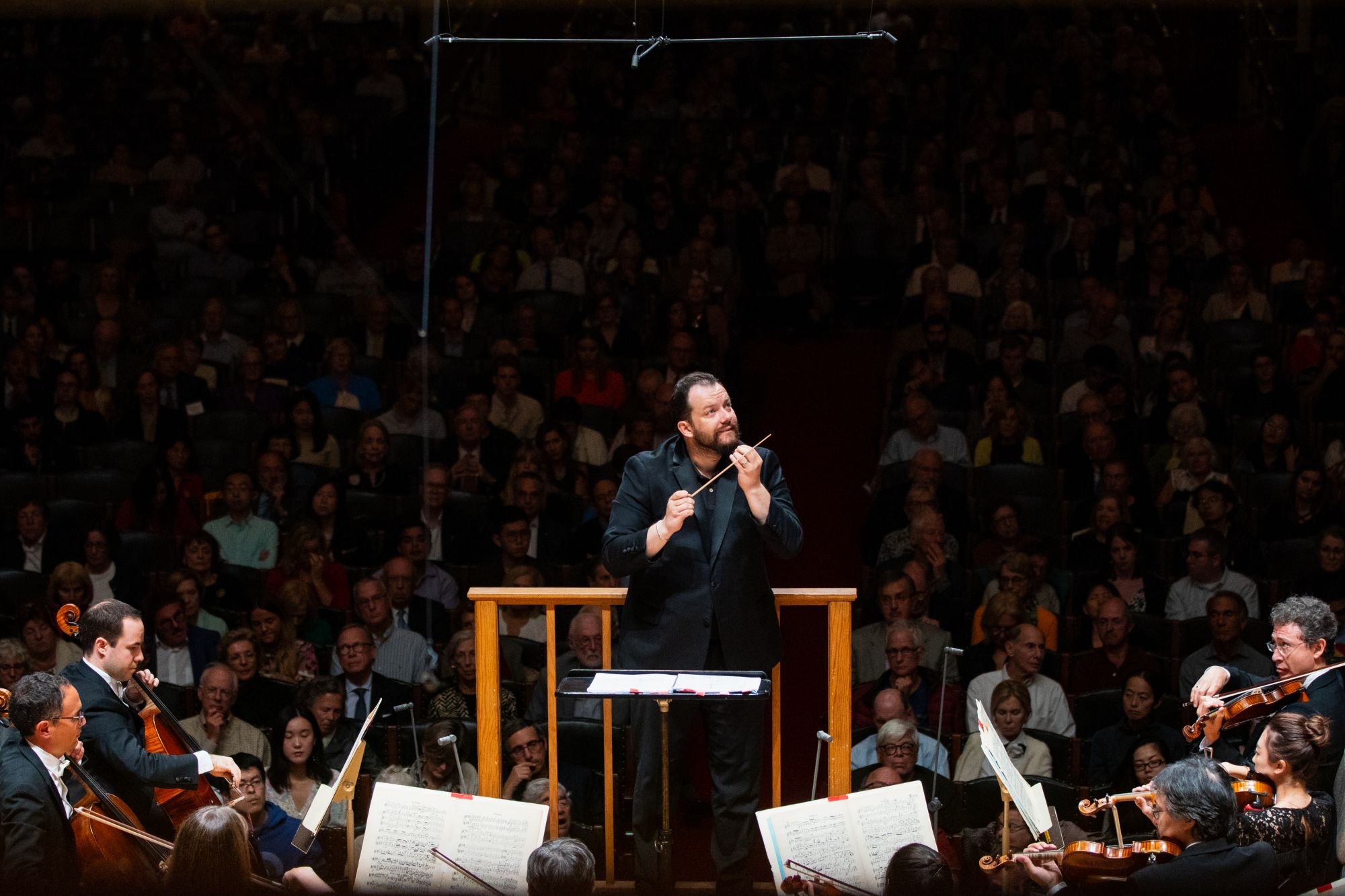The BSO Performs Two Classics: Beethoven and Strauss

It’s Saturday evening and the BSO is alive. The audience that has come to this evening’s performance of the Beethoven Violin Concerto, given to us by Augustin Hadelich, is the sort that represents the symphony’s continued prominence in the Boston cultural sphere: one sees the young, the old, out in their best, or just out of class from the Conservatory. As with any big soloist, Augustin has brought a crowd with him.
The seats around me are comfortably filled, and it’s as usual that walks from all parts of my life show up as I’m heading there. I’m treated to running into musicians I met at music festivals, friends from classes at schools that are here with tickets from the Symphony Society on campus, or even BSO patrons that have been working with our own Harvard Radcliffe Orchestra recently. All in all, there’s a strong positive sense of anticipation for the performance. We all expect Nelsons to impress yet again.
Hadelich delivers stunningly from the first note. It is incredible to think that there are so many ways to play the Beethoven, and yet somehow, every note and run, every long phrase and sung moment, sound distinctly in his own voice. He is deliberate, yet tastefully phrases this decisiveness in a way that makes one hear the music in a new way; his way. As a fan of the hallmark Oistrakh recording, his style is fairly far removed from the ‘home’ of my Beethoven impression, yet it convinces me with due reason. He is careful and measured, but not flat and at all blocky, with a crystal clear sound that maintains the even sublimity of the concerto.
The soloist is incredibly consistent, and his equanimity with the orchestra on stage only corroborates this comfortability. He lets loose sometimes with the theatricality even though he doesn’t need it, sometimes lofting the bow off of his instrument in one fell swoop and beaming at Nelsons as the two bring a particularly climactic section to a close, both in turn inspiring passion in all of the players behind him. Even the section violins in the very back, which I could see easily, are beaming nearly the entire time. Sure, the BSO is working hard to deliver the stage for Augustin to perform on: but they too know that they’re getting treated to a great musical event.
Augustin’s third movement runs are nearly flawless, and his phrasing in the long, singing moments of the first movement are poignant and well placed, all the while never coming across as rushed or hurried. The second movement shows just how familiar he is with the piece, with the arresting lyrical phrases filled with color in his clear, lucid, patient enunciation, and all in all, the audience can feel that the performance is a massive success.
—
While the main show on posters might have been Hadelich's Beethoven, the Strauss that follows isn’t any less of an artistic project. It’s an achievement to put on the wandering 36 minute work in a weekend’s worth of performances, and put it together in less time, but Nelsons is ready for the task and deftly leads the BSO through the single movement epic.
There are some parts of the Strauss that might have been too much for the orchestra. From my seat, I was entertained by a gentle bow tap on the page by our new principal cellist after the section came in awry on a tough high pitch; he smiles, and the assistant principal nods knowingly in confession. One can tell Tom Rolfs and the brass section en masse have been building the endurance necessary for taking the rises and falls of the piece on for a while now. Their sounds are full and confident. Some of the parts put out by the horns and trumpets are simply incredible, and one wonders why Strauss loved compound interval leaps into the stratosphere as much as he did. Combined with the lack of movement breaks, the whole orchestra’s preparation for this concert is tangible.
The louds are loud, and the softs are soft, and overall, the work is incredibly sensitive and well delivered. While the Beethoven was obviously the star of the performance, the Strauss still delivers a new flavor that pairs with it perfectly; and as the program hinted, hopefully the BSO achieved a good recording over the weekend, and we can hear it released on Deutsche Grammophon soon.
Overall, Andris Nelsons has done a wonderful job of building yet another fulfilling week of concerts in Boston. The program is varied and exciting, and the insistence in Symphony Hall upon an artistic vision is ever present. When one comes to see a BSO performance with a lineup tonight, one expects something pivotal and authentic: nothing to break the score, but something to know that you heard a work of art in the moment. Tonight we got that in earnest, and one can still hear the clapping that surrounded the unabashed smile of satisfaction that played over Hadelich’s face following his encore. Hopefully we can have him and this passion back again, and continue the BSO’s great tradition of arresting Beethoven concertos that we’ve received at Tanglewood and Symphony Hall in the last few years.